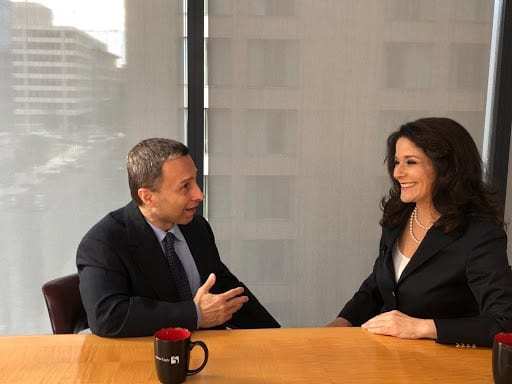
A Stock Market Crash Proof Portfolio May Feature Fixed Indexed Annuities
PAUL DYKEWICZ
February 18, 2020

A stock market crash proof investment portfolio can include fixed indexed annuities that are designed to provide a positive return in bullish years and avoid any losses in bearish times.
The trade-off of investing in fixed indexed annuities comes from giving up significant market gains in the best years to insure against ever taking losses. Insurance companies sell the fixed indexed annuities and use their corporate security ratings to entice risk-conscious investors, despite the absence of the 100 percent protection bank deposits receive from the Federal Deposit Insurance Corporation (FDIC) up to $250,000 for each person per bank.
Two fixed indexed annuities aimed at preserving capital when stocks fall are Lincoln National’s OptiBlend 5 indexed annuity and the Delaware Life Insurance Company’s Retirement Stages 7 Fixed Index Annuity, said Todd Phillips, president of Estate Planning Specialists, of Gilbert, Arizona.
“My favorite indexed annuity is Lincoln National’s OptiBlend 5,” said Phillips, who specializes in reviewing the available fixed indexed annuities and their various investment choices.
Selected Fixed Annuities Offer Investors a Stock Market Crash Proof Alternative
Lincoln National Life’s OptiBlend 5 is an Indexed Annuity designed to produce growth when the market is up and avoid losses completely when the market is down, Phillips said.
That annuity has four Indexed Strategies that can be used each year and three of them are based on the S&P 500. However, they have somewhat limited exposure to that index. For example, annuity holders who like the S&P 500 will receive exposure of 35 percent to the upside, Phillips told me.
However, Phillips said the investment strategy that he likes best with Lincoln National Life’s OptiBlend 5 is the Fidelity AIM Dividend Index (IXXSC), which gives 89 percent exposure.
Annuity holders can allocate the funds in any percentage combination they choose. For example, this year they could allocate 70% into the Fidelity AIM Dividend Index and 30% into the S&P 500 with Inflation strategy, Phillips said.
Next year, holders of that annuity can change their allocation to any combination of strategies and weightings in each that are desired. Each year the interest crediting starts fresh with an opportunity to reallocate among the indices.
Morgan Stanley Index Is Aimed at Offering Stock Market Crash Proof Protection
The Delaware Life Insurance Company’s Retirement Stages 7 offers investors access to the Morgan Stanley Global Opportunities Index. This rules-based strategy uses portfolio construction concepts that seek positive return opportunities in different market environments. That index provides access to global opportunities by investing in asset classes of equities, bonds and commodities.
The Morgan Stanley Global Opportunities Index tries to take advantage of the persistence in the long and short-term price moves in various markets. Plus, the portfolio risk is monitored daily with a 5 percent volatility target mechanism to reduce the impact of price fluctuations. For further details and the latest information about fixed indexed annuities, Phillips can be reached at 1-888-892-1102.
Pension Fund Chairman Discusses Stock Market Crash Proof Fixed Index Annuities
Investors who are worried about attaining superior investment returns but also fearful of the threat of a stock market crash should consider alternatives, said Bob Carlson, who leads the Retirement Watch advisory service and serves as chairman of the Board of Trustees of Virginia’s Fairfax County Employees’ Retirement System with more than $4 billion in assets.
“Too many investors think the investment world consists of stocks and cash,” Carlson said. “When they believe stocks will do poorly, they move more of their portfolios into cash. But there are a lot of other options.”
When investors believe the markets are in the early stages of a sustained downturn, they can buy fixed indexed annuities to preserve capital, Carlson added.
What Kind of Investors Should Consider Fixed Indexed Annuities?
Fixed indexed annuities should be considered by two types of investors, Carlson said.
“The first type is a conservative investor who puts a premium on safety of principal but would like the chance to earn a higher return than currently paid by safe investments such as money market funds, certificates of deposit and short-term treasury bonds,” Carlson said. “If the index the investor selects does well, the annuity will be credited with interest that exceeds what would have been earned by a safe investment. If the index doesn’t do well, the investor’s principal is safe. There’s no risk that the annuity value will decline if the markets decline.”
The second type of investor is one who has had a portion of the portfolio in equities but is worried about the stock market, Carlson said. That investor wants to earn something more than money market returns if the market continues to do well, but fears fallout from a market slide, he added.
“This investor can move a portion of the stock investments into a fixed indexed annuity, Carlson said. “If the index to which the annuity is benchmarked continues to rise, the annuity will receive interest exceeding the money market returns. The interest would be as high as the index returns, but it will be more than from a traditional safe investment. Yet, the investor’s principal will be safe in case the market does decline.”
Fixed indexed annuities are complicated, Carlson cautioned. It is important to consult with an insurance agent who works with a number of insurance companies and reviews all or almost all of the offerings, since an investor does not want to be restricted to the annuities from one or two insurers, Carlson added.
“You need a full explanation of how the interest credited to your annuity is determined,” Carlson said. “You also want to know all the fees and expenses that are deducted from the return before it is credited to your account.”

Bob Carlson answers questions from Paul Dykewicz during an interview.
‘Millionaire Maker’ Radio Host Discusses Role of Stock Market Crash Proof Annuities
Safety-first investors who want to avoid losses and are willing to accept reduced gains when the market rises are the kinds of people the fixed indexed annuities are designed to attract.
Hilary Kramer, host of a national radio program called “Millionaire Maker” and head of the GameChangers advisory service, said investor interest in fixed indexed annuities depends on their “gut instincts.” Those who have “no confidence” that the market will trend upward over their lifetime like it has in the past may want to lock in a little income while protecting their wealth, she added.
“You’ll sleep better and wouldn’t be happy with that component of your portfolio fully exposed to the market cycle anyway,” said Kramer, who also leads the Value Authority advisory service.
Fixed Indexed Annuities Provide Stock Market Crash Proof
“But always do the math,” Kramer cautioned. “The S&P 500 can be a volatile ride year to year, but it only drops one year out of four and in the long run it has generated an annualized return of roughly 3 percent in dividends and another 8 percent in appreciation. If you’re giving up two-thirds of the return in order to insure against a one in four chance of a bad year, you’re paying a big premium for peace of mind.”
Meanwhile long-term Treasury debt still pays 2 percent a year reliably, so that payout, plus stock dividends, provides a decent income base for most investors, Kramer counseled.
“You’ll never have to sell the stocks or the bonds while remaining fully exposed to the upside,” Kramer said. “In the bad years, you make the income. In the good years, you make the income and participate in the upside. The only question there is how hard you need your money to work across the market cycle. People who are still even casually focused on accumulating wealth should stay in the stock market. Again, this is where psychology comes in. Dividends are defensive, which is why I have such success with my Value Authority service.”
However, the use of a diversified growth strategy can deliver huge returns if small stocks are given enough time to mature, Kramer said.

Paul Dykewicz interviews Wall Street money manager Hilary Kramer, whose investment advisory services include Turbo Trader, High Octane Trader and Inner Circle.
Whether the kind of catastrophic event or series of calamities that typically cause a stock market crash could occur anytime soon remains an open question. The biggest current threat may be the coronavirus, which has caused nearly 2,000 deaths and 73,000-plus infections as of Feb. 18.
Public health officials in China at the epicenter of the outbreak are warning that the threat could be 20 times more deadly than the flu virus. Even though the pace of the infection’s spread could ease in the summer months as the weather warms and people spend more time outdoors, the coronavirus could cause a second wave of infections in the fall when the temperatures cool, just as occurs with the flu.
Another Stock Market Crash Protection Strategy Uses Dividend-Paying Stocks
Risk also can be reduced by investing in equities that pay a dividend, which historically outperform non-dividend-paying stocks and funds for the long term.
One of the highest-profile and most respected champions of dividend-paying stocks is Jeremy Siegel, a finance professor at the University of Pennsylvania’s Wharton School. Siegel’s “Stocks for the Long Run” was named by the Washington Post as one of the 10-best investment books of all time.
Dr. Mark Skousen, who heads the Forecasts & Strategies investment service that is celebrating its 40th anniversary this year, has cautioned in the past that a downside to many annuities is that they limit portfolio growth. For example, a 65-year-old retiree will never see the value of his $500,000 grow if he invests in fixed indexed annuities, while inflation gradually erodes his investment.
Even though Dr. Skousen told me his wife invests in fixed indexed annuities to avoid losing money, he personally favors investing in quality companies that pay above-average dividends and are likely to raise the payouts in the future. Professor Siegel has said it best: “Dividends are the critical factor giving the edge to most winning stocks in the long run.”
Many of the stocks recommended by Forecasts & Strategies fit the dividend-paying category. For investors who want to pursue growth and buy related call options in pursuit of even bigger gains, Dr. Skousen also offers call option trades in his Home Run Trader, Five Star Trader, TNT Trader and Fast Money Alert trading services.
Fixed indexed annuities offer a stock market crash proof hedge in the event that bearish fears grip investors and share prices plunge. The fixed indexed annuities are designed to allow the insurance companies that offer them to turn a profit but investors who are willing to forgo some potential gains when the markets rise can buy them to stock market crash proof their portfolios.